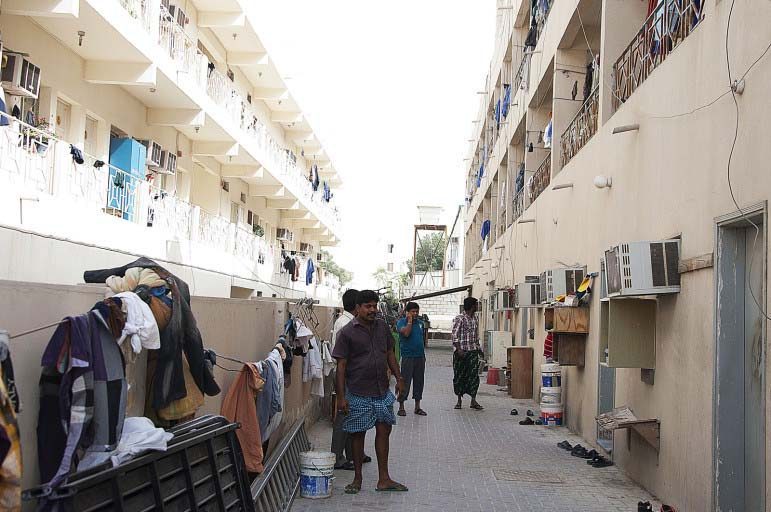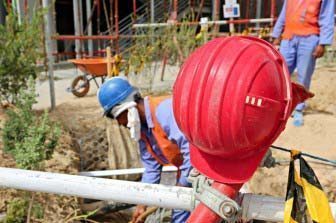
Qatar has pushed back plans to hire 100 more labor inspectors by the end of this year, a government minister has indicated.
The move comes despite a pledge to keep a closer watch on how employers are treating the country’s blue-collar workforce.
For several years, rights organizations – including Qatar’s own National Human Rights Committee – have argued that the government is failing to employ a sufficient number of labor inspectors relative to the country’s swelling construction sector.

These inspectors are responsible for ensuring employers follow Qatar’s labor law and that worker housing complies with local regulations. Additionally, specially trained inspectors visit construction sites to monitor adherence to safety standards.
Critics have long said that the labor inspection system is one of Qatar’s major weaknesses in protecting migrant workers from abuse.
The country has many good laws on its books, but fails to properly enforce them, they add.
By the numbers
On Tuesday, Abdullah bin Saleh Al Khulaifi – Qatar’s minister of labor and social affairs – told the International Labour Organization (ILO) that Qatar currently employs 300 inspectors, QNA reported.
Though that’s double the 150 inspectors employed slightly more than two years ago, it’s the same figure that the Ministry of Labour and Social Affairs (MOLSA) cited in May.
Previously, MOLSA said there would be 400 inspectors by the end of this year, but Al Khulaifi told the ILO this week that this target won’t be achieved before the end of 2016.
“The government of Qatar is working hard with employers and workers to … provide the best to the guest workers who contribute to the construction of the State of Qatar,” Qatar News Agency (QNA) quoted the minister as saying.
However, with government officials predicting the most labor-intensive stage of Qatar’s construction boom to peak by mid-2017, the delay in increasing the number of inspectors may come too late.

Human rights experts have previously said that employing more labor inspectors is an effective way of identifying labor law violations and improving workplace safety, though 300 for a population of several hundred thousand blue-collar workers is “obviously inadequate,” according to Amnesty.
Each year, MOLSA “blacklists” hundreds of companies, preventing them from sponsoring additional foreign workers, for breaking the rules. That includes 807 firms in the first half of 2015, a figure that put the ministry on pace to sanction a much lower number of businesses than in previous years.
In 2013, Amnesty said inspectors were being instructed to complete multiple inspections a day, preventing them from properly probing incidents of abuse.
ILO visit
At the same ILO meeting, members voted to send a mission to Qatar to investigate allegations of “forced labor” brought forward by delegates last year, according to Belgian newspaper De Standaard.
A motion tabled at this week’s meeting summarized the complaint:
“From the moment migrant workers begin the process of seeking work in Qatar, they are drawn into a highly exploitative system that facilitates the exaction of forced labour by their employers. This includes practices such as contract substitution, recruitment fees (for which many take out large, high-interest loans) and passport confiscation.
The Government of Qatar fails to maintain a legal framework sufficient to protect the rights of migrant workers consistent with international law and to enforce the legal protections that currently do exist. Of particular concern, the sponsorship law, among the most restrictive in the Gulf region, facilitates the exaction of forced labour by, among other things, making it very difficult for a migrant worker to leave an abusive employer.”
Al Khulaifi told the ILO that all the issues contained in the complaint has been dealt with “seriously,” according to QNA.

He also referenced the recently passed changes to Qatar’s sponsorship law, telling delegates that it gives workers the right to change jobs at the end of their contract and eliminates the exit visa system so that expats can leave the country without the prior permission of their employer.
However, the actual text of the new law states that expats will have to ask the Ministry of Interior for authorization to exit Qatar. The ministry, in turn, will wait for the sponsor’s approval or objection before permitting the applicant to leave.
Ultimately, ILO delegates voted to assess the situation in Qatar themselves and plan to visit the Gulf state before the organization’s next governing body meeting in March 2016.
The ILO could decide at that session to establish a commission of inquiry, its highest investigative mechanism, to take a closer look at the complaint against Qatar.
Thoughts?







